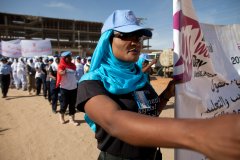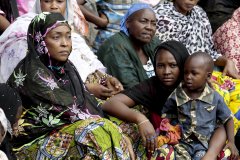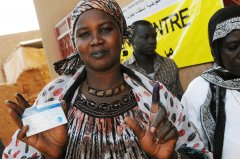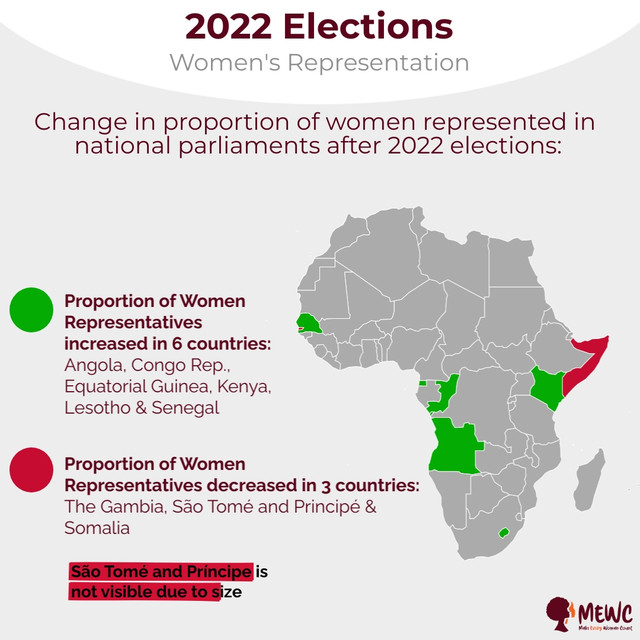Gender Issues Showlist
Women, Peace & Security
UNSCR 1325 calls on all parties to: protect and respect the rights of women and girls in conflict & post-conflict; increase women participation in all conflict resolution, peacekeeping and peace-building & to end impunity by prosecuting perpetrators of sexual and other violence on women and girls
index.php?option=com_content&view=category&id=56&Itemid=1913
Human Rights of Women
Thirty six years after the adoption of CEDAW, many women and girls still do not have equal opportunities to realize rights recognized by law. Women are denied the right to own property or inherit land. They face social exclusion, “honor killings”, FGM, trafficking, restricted mobility, early marriage,...
index.php?option=com_content&view=category&id=44&Itemid=1908
Violence Against Women
Violence against women is the most shameful human rights violation. Gender based violence not only violates human rights, but also hampers productivity, reduces human capital and undermines economic growth. It is estimated that up to 70 per cent of women experience violence in their lifetime
index.php?option=com_content&view=category&id=69&Itemid=1912
Political Participation & Leadership
Where women are fully represented, societies are more peaceful and stable. Women political participation is fundamental for gender equality and their representation in positions of leadership must be a priority for all Africans governments.
index.php?option=com_content&view=category&id=65&Itemid=1911
Latest News
- 2024 Elections Monitoring
- ZIMBABWE: Government Commits to Empower Women
- GAMBIA: Stakeholders Affirm Nutrition Bill Will Empower Women
- TANZANIA: Mabinti Centre - Place of Hope Offers Dignity After Fistula
- ZAMBIA: 'You Will Thrive' - How a UNFPA-Supported Shelter Empowers Women and Girls in Zambia to Break Free From Abuse
- SOUTH AFRICA: Policy Dialogue to Place GBVF Under the Spotlight
- NIGERIA: 36 Percent of Nigerian Major Banks' CEOs Now Women
- SENEGAL: Former PMs and a Lone Woman Among Contenders in Senegal's Crisis-Hit Vote
- GAMBIA: Gambia Lawmakers Move Forward On Bill to Reverse FGM Ban
- ZIMBABWE: Breaking the GBV Cycle, From Burning Nightmare to a Beacon of Hope
CAMPAIGN: A Call for Action on African Women’s Health & Human Rights
Source: WLP
African Women’s Health and Rights Day (AWHRD) on February 4th, is an annual event to raise awareness and advance critical debate around the sexual and reproductive health and rights of women throughout the African continent both at the national and local levels. This year’s event is another opportunity to assess the state of women’s health and rights advancement across the region from the referendum in Sudan, the tensions around elections in Nigeria, the crisis in Democratic Republic of Congo which includes sexual violence and rape as a weapon of war, the women’s human rights abuses in Uganda based on sexuality, and the crisis in Côte d’Ivoire arising from that country’s last elections and the impact of all of these political issues on the political will to implement measures towards the protection of women’s sexual and reproductive health and rights.
BAOBAB for Women’s Human Rights is a not for profit, non-governmental organization working to promote and protect the human rights of women under customary, statutory, and religious laws. As part of the organization’s advocacy work into the February 4th commemoration this year, and based on the fact that Africa is saddled with a lot of issues tied to the continent’s development, including but not limited to the poor state of women’s sexual and reproductive health and rights, and the lack of political will on the part of the various governments to implement all the regional instruments they have committed themselves to, BAOBAB calls on various governments to adhere to provisions they undertake to protect the human rights of its citizens. This includes women’s sexual and reproductive health and rights. Until all the issues surrounding these rights are resolved or at least reduced to the barest minimum, moving forward will be difficult and development will be meaningless.
One critical factor, amongst a host of others, is the lack of information on the sexual and reproductive health and rights of women on the continent which is fundamental to the development of the continent as a whole. Governments MUST make concerted efforts to make this available so that women can make informed decisions about their reproductive and sexual health, for example having information on family planning, HIV/AIDS, etc. and reverse the lamentable rise of gender based violence.
BAOBAB is once again using this occasion to call on all governments on the continent to expedite action on their commitment to the regional instrument, Protocol to the African Charter on Human and Peoples’ Rights on the Rights of Women in Africa. BAOBAB insists that the protocol if well implemented, will not only raise the status of women‘s health on the continent, but will be a factor for fast development in the various countries. We believe that fulfilling the protocol is equal to taking a giant step towards the realization of the United Nations Millennium Development Goals, specifically goals 4, 5, and 6. BAOBAB also calls on all the governments to review and implement the African Union Maputo Plan of Action for Universal Access to Comprehensive Sexual and Reproductive Health Services. Most governments in the region are yet to expedite actions on this and we say delay is no longer an option – the time is NOW.
Sindi Medar-Gould
Executive Director
BAOBAB for Women’s Human Rights
Sindi Médar-Gould is Executive Director of WLP’s partner in Nigeria, BAOBAB for Women’s Human Rights, a non-profit organization working for women’s human rights and legal rights under customary and religious law in Africa.
Cross-posted at BAOBAB for Women’s Human Rights.
CAMPAIGN:Global Action Week 2011 – Girls’ and Women’s Education
Source: UNESCO
To mark this occasion, the Global Campaign for Educationand UNESCO are organizing a series of activities around the world. In Montreal, the UIS is hosting a roundtable on gender disparities in education on 2 May at the Conference of the Comparative and International Educational Society (CIES).
The UIS produces a range of different indicators on gender issues in education. Highlights include:
- Fact sheet on out-of-school adolescent girls
- Interview on women in higher education with Chiao-Ling Chien, UIS statistician
- Global Education Digest 2010 – special focus on gender
- Fact sheet on gender disparities in primary and secondary education
Learn more about Global Action Week 2011:
- Message from Irina Bokova, UNESCO’s Director-General
- UNESCO Education for All
APPEALS/URGENT ACTION: Woman Activist Stands Up Against Corruption, And Now Faces Threats To Her Life In Lake State, South Sudan
Ms Nyok has been working with women in South Sudan since early 2000. She relocated herself to Lake State, Rumbek in 2005, where she substantially contributed to the promotion of women rights and the advancement of their living condition. As of early 2011 she has been experiencing severe harassment and was threatened many times by some of the high commander officers of the army in Rumbek. More than once, she was asked for money and goods and most recently, a high commanding officer demanded that she hand over her organisation's office vehicle. When she refused to give the vehicle, since it is the property of the organization and she does not want to be forced to act dishonestly, Karak Nyok was threatened more than once inside her office compound that she will be ambushed if she does not hand in the vehicle. Ms Karak Nyok now strongly fears for her safety.
Karak immediately reported the sequence of incidents to the local authorities. However, Ms Nyok believes that there is little probability serious take actions will be taken, as she said, “often women are not taken seriously when reporting threats”.
SIHA is appealing to the Government of South Sudan (GoSS) to act against these forms of intimidation and threats against women human rights defenders and activists and to support and promote their work and value their contribution. On behalf of women activists we call on GoSS to end impunity and enforce the rule of law upon its people. The international community and human rights organizations should speak out against the violations of the rights of women activists.
About SIHA: The Strategic Initiative for Women in the Horn of Africa –SIHA is a network of civil society organizations from North and South Sudan, Eritrea, Ethiopia, Djibouti, Somalia, Somaliland and Uganda and is now comprised of over 40 member organizations. SIHA is advocating for social change and gender equality for men and women in the Horn of Africa and working specifically on: gender equality, eliminating violence against women and girls, promoting human rights, peace building and conflict transformation, enhancing women’s leadership and political participation and production and dissemination of knowledge.
For more information please contact This email address is being protected from spambots. You need JavaScript enabled to view it..
BLOGS: The 10 Most Powerful Women at the United Nations
Source: Forbes
In charge of budgets of over $5 billion, capable of mobilizing resources and 100,000 + staff worldwide. Responsible for the coordination of thousands of peacekeepers in conflict zones throughout the world, and leading negotiations for the release of child soldiers in Uganda.
CAMPAIGN: Take Action: Stop Torture In Health Care: Send A Letter To Namibia's Health Minister Demanding An End To The Forced And Coerced Sterilization Of Women Living With HIV
Source: Stop Torture in Health Care
Dear Minister:
I write to express my concern at the coerced and forced sterilisation of HIV positive women in public hospitals throughout Namibia. I further ask you to categorically condemn the practice and make clear to all healthcare professionals that such conduct will result in appropriate disciplinary action.
Reports of the coerced and forced sterilisation of HIV positive women in Namibia surfaced publicly as early as 2007. To date, dozens of HIV positive women from throughout Namibia have recounted their own experiences of being subjected to coerced and forced sterilisation. In all of the reported cases, informed consent was not properly obtained for one or more of the following reasons: consent was obtained under duress; failure to inform patient of the contents of the consent form; and a failure to provide full and accurate information regarding sterilisation procedure.
Subjecting HIV positive women to coerced and forced sterilisation undermines Namibia’s efforts to effectively respond to the HIV pandemic by increasing stigma and discrimination already facing HIV positive women. Such practices discourage HIV positive women from seeking healthcare services when it is critically needed.
Furthermore, the practice is contrary to Namibia’s domestic, regional and international legal obligations. These include the right to be free from cruel, inhuman, and degrading treatment; the right to liberty and security of person; the right to health and family planning; the right to privacy; and the right to equality and to be free from discrimination. These legal obligations are reinforced by medical guidelines issued by the International Federation of Gynecology and Obstetrics (FIGO), which specifically require information regarding the nature of the procedure, its consequences and risks, alternative options for family planning and its irreversible nature be provided prior to obtaining consent.
The coerced and forced sterilisation of HIV positive women has been going on for too long and I ask that you provide the necessary leadership to end this practice.
Sincerely,





